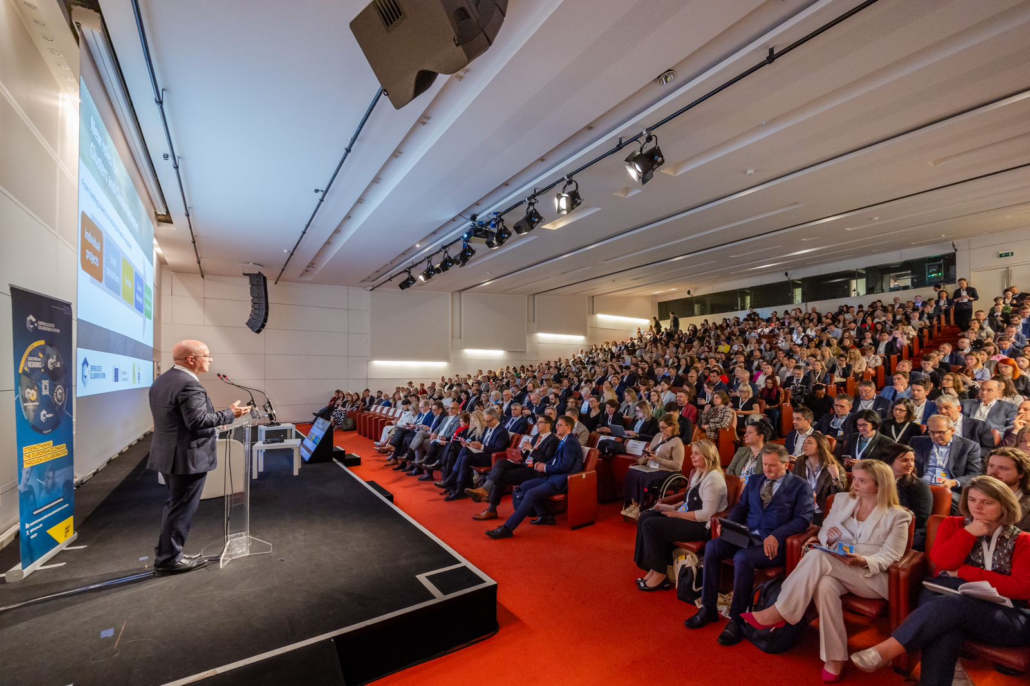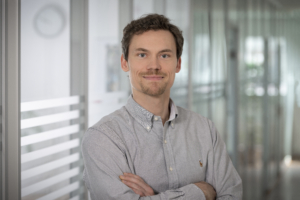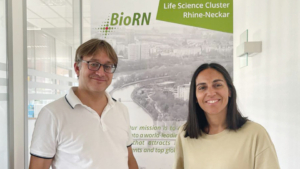
Full house at European Cluster Conference
More than 900 experts from clusters and the EU Commission discussed at the sold-out 9th European Cluster Conference what cluster policy is needed to make Europe a world leader in prioritised technology fields such as the green and digital transitions and biotechnology.
Compared to the USA and China, EU biotech clusters appear to be dwarfed by the lack of industry-specific support in terms of access to funding, resources and scaling up bioproduction. This may be because, although Europe is highly innovative in research, it does not translate this into marketable solutions as effectively as its global competitors. From the perspective of the European Federation of Pharmaceutical Industries and Associations (EFPIA), the solution – at least as far as pharmaceutical biotechnology is concerned – lies in concentrating resources in a few large clusters in order to keep pace with global hubs such as Boston, San Francisco or Maryland. In view of the high number of innovative SMEs in Europe, however, the networking of expertise flanked by appropriate funding and sector-specific political and regulatory support could also help Europe to regain lost ground. In Brussels more than 900 experts fromclusters and the EU Commission discussed at the sold-out 9th European Cluster Conference what cluster policy is needed to make Europe a world leader in the technology fields that have been prioritised, such as the green and digital transitions and biotechnology.
Back in 2022, experts from Charles River Associates made seven recommendations on behalf of EFPIA to improve the factors that attract pharmaceutical investments in the EU. Greenfield projects outside of clusters favoured by EU Horizon funding were sharply criticised. Instead, the pharmaceutical experts want to see the EU concentrating scientific, clinical and translational expertise in a few good locations, along the lines of the global pharma cluster Basel, the hubs around Oxford and Cambridge or the world‘s third largest gene therapy centre Catapult in the UK, where biotech value creation can be measured by deal volumes.
Cluster experts from various sectors expressed a completely different view at the ECCP.2024, including Montserrat Gaban, Director General of the Council of European Bioregions, CEBR, who spoke out in favour of more networking and mapping of existing expertise in topic-specific metaclusters. At the conference opening, Thierry Breton, European Commissioner for the Internal Market, addressed the topic of cluster networking with reference to the Euroclusters project. “We must overcome cross-border barriers to the internal market,” he said in a video greeting. That this is not always easy was not difficult to hear from conversations on the fringes of the conference. „There are two worlds in EU cluster policy,” according to Slovenian cluster managers, „a well-funded one and one with fewer resources that is concerned with survival.”
How the claim “it is important to grow small clusters to innovation networks” formulated by Antonio Novo, President of the European Clusters Alliance, could look in reality, however, was not specifically addressed. In discussions, the cluster managers conveyed that although the EU Commission is endeavouring to create the conditions for growth and an appropriate regulatory environment, the clusters, with their very different and specific expertise, feel that their sector-specific needs are not being heard or understood. Whether the USA and emerging Asian countries are better able to provide the relevant expertise in the responsible bodies – keyword: mindset –was also not thematised at the conference.
Innovation scores
Hard facts on innovation scores and the corresponding global ranking in key technologies were presented at the conference by Jan-Philippe Kramer, Team Leader, Data and Policy, European Cluster Collaboration Platform, at Prognos. According to the analysis, China has already caught up with the EU in terms of innovation through massive investment and sector-specific policies and is on its way – with a steep growth curve – to catching up with the innovation champion USA (and – not shown – world champion Switzerland). According to Prognos data, 17% of the mapped EU cluster organisations are in the healthcare and agrifood sectors, respectively, and 18% in the energy sector. Kramer emphasised the great importance of clusters in the innovation process, citing that the densely clustered Spanish province of Catalonia alone accounts for around a third of Spanish patents. Kramer noted that the most innovative clusters are those that are well-positioned in the green and digital transition and emphasised that the achievement of innovation policy goals depends crucially on cooperation with clusters, but that the success of clusters is also highly dependent on long-term, coherent and practical political support through stable political framework conditions. To date, 14 EU member states are active in cluster policy.
Cleantech and biotech solutions play a strategically important role when it comes to the competitive reorganisation of existing value chains and the creation of new ones that are climate-friendly and low in fossil fuels. Montserrat Daban, President of CEBR, which represents 50 European Bioregions, emphasised: “We have to map the technological competencies that are available in clusters.” Due to the increasing fusion and simultaneous use of technology fields such as AI/data sciences, biotechnology and medical technology/diagnostics, it is crucial for success to develop solutions cross-sectorally and to network competences, such as in the EU Fab Initiative from the pandemic year 2022. It is about networking the many small contract manufacturers in order to be able to produce a wide variety of vaccines in sufficient quantities when needed. In Europe, with its numerous SMEs, this is a prime example of how expertise can be bundled thematically without geographical clustering.
Like many visitors to the conference, Daban called for more stability and predictability in political priorities: “Investors need only two things: stability and critical mass, that is how we can attract money”, she said. This probably meant a long-term commitment and rapid implementation, as recently demonstrated by the UK government with its 10-year biomanufacturing initiative and the US with its modern bioeconomy strategy. According to current plans, the new EU Commission will probably not take up this important topic until mid-2015 and adapt it to the current global state of development while emerging countries such Malaysia have already done.
Focus on implementation
The discussion then turned to the priorities of the eagerly awaited new (old) Commission. It is clear that the desired green and digital transformation will require a lot of investment while fresh money is not available due to the mid-term financial plannings of the EU. However, how the money is to be distributed across the fields of SME funding, scaling and product roll-out will not be decided until mid-2025.
During an interactive brainstorming session initiated by the Commission on cluster needs in various fields of technology, it became clear that not much can be created in the clusters without funding. However, Christian Ketels from Innovation Fund Denmark previously had summarised well what the many cluster managers gathered in Brussels are actually concerned about. Much has changed as a result of the current geopolitical crises, he said: “The current challenges must be tackled in co-operation. No single company can do that any more. That‘s why we need new forms of co-operation and that is expressed in the clusters and in its cooperation. It is a real challenge, because only a few recognise the problem-solving expertise of clusters.” Their actual task is not to offer services for companies, but to offer industry the strategic solutions it needs. “We need to talk to politicians with one voice, because we hold the means of implementation in our hands. It is important that EU policy does not see clusters as recipients of funding, but as partners in solving problems.” With regard to the maximum funding period of 10 years, Marc Andres from Flanders innovation & entrepreneurship added “making clusters self-sufficient is not a good idea, because it drives them into dependency from industry.”
Verónique Willems, Secretary-General of SMEunited, made it clear in Brussels that the pandemic had driven a lot of SMEs into bankruptcy, but that state subsidies did not necessarily lead to a loss of competitiveness. “You can‘t buy them, she explained. Companies would tend to avoid the funding offer simply because of the time-consuming application process, but would love clusters with a thematic focus, as these help take away investors fear of risk and offer infrastructure and network value.”
Timely adapt processes
In addition to the biotech incubators‘ permanent hunger for funds, the 70 exhibitors in Brussels – despite major support from EU funding – are also struggling with a completely different problem: regulatory issues. While the US has a single authority responsible for the approval of therapeutics and their accompanying diagnostics, particularly in personalised medicine, there is a lack of notified bodies for diagnostics subject to EU medical device regulation, it was said on the fringes of the conference. Coordinated authorisation of early and companion diagnostics for novel medicinal products is hardly possible, according to various stakeholders. It is therefore no wonder that companies such as Adrenomed AG are seeking the first accelerated approval procedure for the first effective sepsis medicine in a patient population previously stratified with two biomarkers in the US. Another example in a row is the early cancer diagnostics company Harbinger Health Inc., founded by German researchers in the US with US$80m seed money, is validating its approval-relevant methylation pattern liquid biopsy tests covering the Big Five cancer indications in Stage I and II, on 10,000 US citizens.
It remains to be seen whether, as suggested in the Green Transition session moderated by Kirstin Dunlop, CEO of the EIT Climate KIC, the clusters can only be helped by a green dictatorship that implements industry-friendly rules as quickly as Singapore, China and the USA.The newly elected European Commission and the decision criteria extracted from the dialogue with the experts will be the focus of attention and discussion.


 BioRN
BioRN